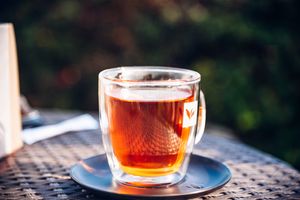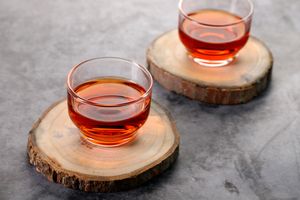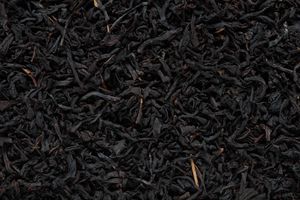Orange Pekoe Tea Guide | Key Characteristics & Benefits
By Andrew Warner

When you’re first getting started with teas, you’re likely to come across the phrase “Orange Pekoe.”
While it may sound like a fruity, citrus-infused tea blend, there’s no citrus (orange or otherwise) involved in producing this popular tea variety. Likewise, the name Orange Pekoe has nothing to do with the color of the brewed tea, which is actually more of a dark brown or even black hue.
So just what is Orange Pekoe? In this blog post, we’ll answer that very question. This high-quality tea from India and Ceylon is often revered as the pinnacle of black teas. If you’re not quite sure where to begin on your tea journey, you can rest assured that these tea leaves are a great option for you.
What is Orange Pekoe Tea?
While the name Orange Pekoe tea evokes imagery of citrusy sweet tea leaves, the name actually refers to a common tea grading scale for South Asian black teas.
Orange Pekoe refers to how the tea leaves are plucked from the Camellia sinensis plant. More specifically, it tells us when and where they’re plucked. When black tea leaves are harvested, the age of the leaves and time of the season can have a great impact on the overall flavor of the final product. Orange Pekoe harvesters pluck the youngest leaves possible to ensure a smooth and robust final product.
The term “Pekoe” likely comes from this aspect of the harvesting process. Younger tea leaves have fine white fibers — almost like peach fuzz — on their surface. “Pekoe” comes from the Chinese word “peh-ho,” meaning “white down.”
The “Orange” half of the name is most commonly attributed to the Dutch East India Company, which was a major proponent of bringing this type of tea to Europe. The Dutch royals are in the House of Orange-Nassau. In the 16th Century, selling the tea with the word “orange” in the name helped give it a regal air, making it more marketable.
Today, the Orange Pekoe grading system has stuck with us. In spite of its Dutch and Chinese etymologies, this tea is neither from the Netherlands nor from China. Instead, most Orange Pekoes are grown in Assam, Sri Lanka and Darjeeling. Orange Pekoe tea leaves can be graded into further categories, with Orange Pekoe being the lowest and “Finest Tippy Golden Flowery Orange Pekoe” being the highest. Since that last one is quite a mouthful, we typically just use the acronyms OP and FTGFOP.
Higher quality Orange Pekoes will include more of the Camellia sinensis plant. For example, Flowery Orange Pekoe includes the buds as well as the first leaves. Orange Pekoes can also be divided into whole leaf and broken leaf categories — broken Orange Pekoe is a slightly lower quality option.
Orange Pekoe teas are contrasted with other varieties of black tea in their quality. While they may still be black tea in and of their own right, Orange Pekoe tea leaves yield a much higher quality brew than most other black tea leaves on the market.
In contrast with Orange Pekoe, the term “fannings” typically refers to the lowest quality black tea out there. Fannings are the trimmings and tea dust leftover from processing higher quality tea leaves. You typically won’t find teas marketed as fannings. But you will find fannings in especially low-quality tea blends, so we recommend searching for Orange Pekoe teas.
Here are some of our favorite Orange Pekoe teas available in 2022:
- Tetley Orange Pekoe
- Harney & Sons Orange Pekoe
- Twinings Ceylon Orange Pekoe
- Fortnum & Mason Assam Tippy Golden Flowery Orange Pekoe
What Does Orange Pekoe Taste Like?
So if it doesn’t taste like oranges, you’re probably wondering: What does this taste like, then?
The answer is quite simple — Orange Pekoe tastes like high-quality, smooth and robust black tea. Like other black teas, it has a tendency to be on the bitter side. It pairs especially well with a little bit of milk and sugar (it’s often the go-to choice for masala chai). Brewed strong, it has a bold and malty flavor.
Thanks to the younger tea leaves, Orange Pekoe also has a slight fruitiness to it that you won’t find in lower quality tea leaves.
Like all other teas, the terroir of the growing region can impact the overall flavor profile. For instance, Ceylon teas, which are grown in the mountainous island nation of Sri Lanka, typically have a smoother and more floral flavor to them. Orange Pekoes from Assam, on the other hand, will have a slightly stronger malt flavor to them. Darjeeling will lend the fruitiest, almost grape-like flavor to your morning cup of tea.
All in all, though, Orange Pekoe is the prime black tea — if you find that you prefer black varieties to green tea or white tea, you may like Orange Pekoe best. While Orange Pekoe is best without any additives, you can also find it in particularly high-quality tea blends like English Breakfast tea. For the best flavor, we also recommend loose tea over tea bags, as tea bags tend to use lower quality, stale teas — loose leaf brands will ensure that you get the most bang for your buck.

Six Benefits of Orange Pekoe Tea
Orange Pekoe tea isn’t just delicious. It also has plenty of health benefits, thanks to the abundance of phytochemicals and antioxidants that help burn fat, fight cancer, keep you alert and more. Here are just six benefits to incorporating Orange Pekoe tea into your tea repertoire.
Combat Premature Aging
Orange Pekoe tea has a high concentration of an antioxidant called rutin. This little chemical compound is awfully mighty. Fighting against wrinkle-causing free radicals in your body, rutin can be hugely helpful in promoting healthy skin and fighting against premature aging.
Lower Cholesterol
As with most other teas, Orange Pekoe has strong cholesterol-lowering properties. Tea-drinking cultures across the world have been shown to have lower cholesterol in numerous studies. This means decreased risk of heart disease and all of the other nasty effects of high cholesterol. This is likely because the antioxidants present in tea fight the so-called “bad” cholesterol in your body without going for the good cholesterol.
Decrease Blood Pressure
Just as Orange Pekoe helps lower your cholesterol, it also has a beneficial effect on your blood pressure. Not only does tea help soothe and calm your nerves — which can, in and of itself, reduce your blood pressure — but the beverage on its own actually lowers your blood pressure. Studies have shown that consumption of tea can decrease your blood pressure significantly, making it a healthy option for individuals looking to reduce it..
Reduce Inflammation
Much like chamomile tea, _Camellia sinensis _does a great job of relaxing your blood vessels. In turn, this significantly reduces inflammation you may be experiencing. Orange Pekoe can be a particularly tasty and helpful option for you if you’re struggling with inflammatory symptoms.
Keeps Your Brain Healthy
The antioxidants in tea aren’t just good for fighting heart disease. They’re also shown to reduce neurodegenerative damage caused by diseases like diabetes or mere aging. One study using broken Orange Pekoe to treat diabetic rats showed that the tea had a significant impact on slowing damage caused by the disease. This, in turn, helps prevent neurodegeneration — that is, the gradual decline in brain function that may occur alongside the disorder.
Helps to Fight Off Infection
Last but not least, Orange Pekoe can also do a great job at warding off infections. There’s a reason tea with honey is a common cold remedy — it works! The antioxidants present in _Camellia sinensis _have antimicrobial properties that do an excellent job of fighting off infections like the common cold or influenza. Of course, it’s not a medicine on its own, but it can help supplement other cold remedies and medicines to speed up the healing process.
Orange Pekoe vs. Black Tea: Three Key Differences
Yes, Orange Pekoe is a type of black tea. But not all black teas are Orange Pekoe teas — as mentioned earlier, Orange Pekoe is widely considered to be one of the highest grade black teas out there. But it’s not the only one — here, we’ll break down the differences between Orange Pekoe and other types of black tea.
Origin

The Orange Pekoe grading system is typically used for teas of South Asian origin. We typically see Assam, Sri Lanka and Darjeeling tea labeled as Orange Pekoe. On the other hand, black teas from China don’t typically ascribe to this grading system.
A high-quality black tea from China will typically have a slightly different flavor from Orange Pekoe. That’s not to say Chinese teas are of a lesser quality than Orange Pekoe, of course. Chinese black teas like Keemun are an excellent option for the black tea lover, but due to their slightly different flavor profile, they may not be the best for everyone. If you like your tea with milk and sugar, Orange Pekoe is the way to go — that’s because Chinese black teas are best served without any additives.
Identification
As we’ve discussed, the word “Pekoe” comes from a Chinese word referring to the thin, white fuzz coating the young tea leaves harvested for Orange Pekoe tea. These little hair-like spines are key to identifying an Orange Pekoe.
In many Orange Pekoes, you’ll see these silvery white fibers on the dried tea leaves. This indicates a high quality Orange Pekoe tea — on the other hand, black teas harvested later in the season don’t have this quality to them. Additionally, a brewed cup of Orange Pekoe has a slightly brighter color to them — almost copper-like — than your typical black tea.
Flavor
Because Orange Pekoe is a type of black tea, you may find that it tastes quite similar to any other old black tea. However, as you become more experienced with this type of tea, your palate will surely grow more refined.
Even if you can’t detect the differences now, you’ll notice that lower quality black teas may have a bit more astringency to them than a high quality Orange Pekoe. This means that Orange Pekoe will have a slightly less bitter flavor to it, making it a bit smoother. This also allows the other flavors present in the tea leaves to shine a bit brighter. Orange Pekoe typically has a more vibrant, floral flavor to it than other black teas, as the astringent bitterness is mellowed down a bit.
Does Orange Pekoe Tea Have Caffeine?
As with pretty much any type of tea derived from the _Camellia sinensis _plant, Orange Pekoe does have a significant amount of caffeine present in it. The process of withering and fermenting tea also allows the tea leaves to develop more caffeine. As a black tea, Orange Pekoe is fully oxidized, meaning it will have a much higher caffeine content than a white or green tea.
According to Tetley, their Orange Pekoe tea contains 34 milligrams of caffeine for every 6 ounce cup of tea. That’s about one third of the typical amount of caffeine in a cup of coffee, but a bit more than the standard cup of green tea, which typically has 28 milligrams per cup.
Orange Pekoe Tea FAQs
What happened to Lipton Orange Pekoe tea?
It’s still around! Lipton’s black tea bags consist of high quality Orange Pekoe tea leaves, however they no longer sell it with the phrase “Orange Pekoe” in the name. This is a particularly popular option for brewing a high-quality Orange Pekoe iced tea.
Does Orange Pekoe Tea Help You Sleep?
This depends on how much caffeine you typically ingest in a given day. If you’re used to drinking a couple cups of coffee a day, Orange Pekoe could be a good replacement to help you cut down on caffeine and get better sleep.
That said, it still has a significant amount of caffeine in it. It’s probably not the best option for an after-dinner tea. If you’re looking for a decaffeinated option, we recommend trying Red Rose’s decaffeinated Orange Pekoe tea bags. While it won’t help you sleep, it also won’t keep you tossing and turning all night like a caffeinated version may.
What Tea Is Similar to Orange Pekoe Tea?
If you’re interested in Orange Pekoe but not looking to spend so much money on such a highbrow tea, you’ll still be able to find plenty of options. A Chinese black tea could offer equally tasty flavors at a slightly lower price point. Likewise, Assam, Ceylon and Darjeeling varieties of slightly lower quality can be quite similar in flavor to a traditional Orange Pekoe. Second flush Darjeeling tea is a particularly good option for tea lovers looking to try an inexpensive Orange Pekoe alternative.
